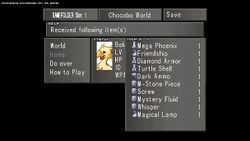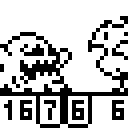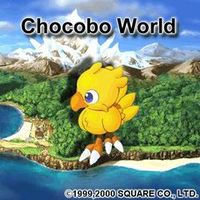The wiki is lacking in content. You can help by creating a new article. See the to do list for more ways you can help.
New user registration has been restored. Thank you for your patience.
Welcome Indie Wiki Jammers! Check out here for info on the jam
Chocobo World
Chocobo World is an electronic simulation game of the Chocobo series that was developed by Square Co. It was originally released for the PocketStation peripheral in 1999, and the game was included with Final Fantasy VIII and its subsequent re-releases. For the original PlayStation release, data for Chocobo World was stored on every Final Fantasy VIII disc, regardless of region, despite the PocketStation only being released in Japan.[1] Chocobo World was later implemented into the computer port of Final Fantasy VIII, making it more accessible to players outside of Japan.
In Chocobo World, the player controls a chocobo named Boko on his quest to save his friend Mog from an evil demon. The game's presentation closely follows the "virtual pet" concept conceived by Tamagotchi. Players care for Boko with a focus on raising his experience through battling monsters; raising him in Chocobo World makes him a powerful ally to summon in Final Fantasy VIII.
Gameplay[edit]

Exploration[edit]
In Chocobo World, Boko perpetually wanders around a nondescript landscape in search of "events" to interact with, such as enemy battles, friendly encounters with Moomba and Cactuar, and "special" events. Depending on how the player sets the "Move" option, Boko may break from his path to navigate to the nearest event perpendicular to his direction of travel. Players can also turn off the "Event Wait" option, eliminating the need for player input to advance, although choosing this option prevents Boko from encountering special events. At any time, players can intervene and halt Boko's movement in favor of manually controlling him.
Events are shown on the map as black dots, while Boko's location is represented by a flickering black dot. When an event is cleared, it vanishes on the map, only to be replaced by another in a random location. When Boko gains a level of experience through battling enemies, the map resets and randomly redistributes events across the world.
Battle system[edit]

Battles are the most common event the player encounters in Chocobo World. Upon confronting an enemy, the player is thrust into the battle screen. Once engaged in battle, the player's only option is to fight until either the enemy or Boko is defeated. Combatant health is represented by numerical HP displayed on the far sides of the playing screen; whoever's count of hit points reaches zero first loses the battle. Combat relies on a variant of the Active Time Battle system featured in Final Fantasy VIII. In battle, Boko and his opponent each have a time counter; the first combatant's counter to reach zero is allowed to attack, upon which both time counters reset and the process repeats itself. By alternately pressing the left and right buttons, players can speed up Boko's time counter, reducing the time required for him to attack. Upon winning a battle, Boko receives a magic stone which is randomly placed on a tic-tac-toe-style board. If three stones line up in a vertical, horizontal, or diagonal row, Boko gains a "level" of experience, which increases his hit point count in Chocobo World and his strength in Final Fantasy VIII. If the player finds Mog within Chocobo World, he will assist Boko in battle as a last resort, i.e., if Boko himself is defeated, Mog will attack the enemy (an attack analogous to the Limit Break in Final Fantasy games). If Mog's attack fails to defeat the enemy, he leaves his partner and Boko loses the battle. After losing any battle, Boko must rest to restore his hit points, but the player is allowed to continue the game without penalty for defeat.
In some events, Boko is approached by Moomba, who gives his friend a weapon. A weapon is simply a series of four numbers that determines Boko's attacking power. During battle, the computer randomly chooses one of the four digits on the weapon number to determine the damage Boko inflicts, or the number his attack subtracts from the enemy's hit point count. If, for example, the weapon is 8531, then Boko's damage dealt to the enemy will be randomly chosen from the digits "8," "5," "3," and "1".
Players can have their chicobos battle each other using the PocketStation's optical communication function.
Collecting items[edit]
Another event in Chocobo World involves Cactuar finding items for Boko. Cactuar appears on the event screen and gives Boko one of four items, labeled A, B, C, and D. Although these items are useless in Chocobo World, they can be "imported" to Final Fantasy VIII to be accessed in the player's item inventory. Depending on the player's rank, the probability of Cactuar finding "D" rank items is greatest, but they are among the most common items in Final Fantasy VIII (e.g., basic status recovery items). Conversely, the probability of Cactuar finding "A" rank items is lowest, but they are very rare items.
Special events[edit]
After gaining ten levels of experience, Boko can find Mog in Chocobo World.
When the player first gains twenty experience levels with Boko, a female Chocobo named Coco bumps into him, and he falls in love with her.
When Boko reaches fifty experience levels, Coco falls into a pit and Boko uses his fishing pole to rescue her. Grateful, Coco gives him a kiss, allowing Boko to execute a more powerful attack in Final Fantasy VIII when summoned by the player.
At level seventy-five, Boko, Moomba, and Cactuar sit back to watch a fireworks display.
At level one hundred, the Demon King captures Coco, and after level one hundred Boko must pursue and defeat the Demon King to rescue his love.
Afterwards, there is a small chance that Coco will appear twice more to kiss Boko for a total of three kisses, with each kiss upgrading his attack in Final Fantasy VIII.
Story[edit]
Mog, a moogle, wants to hunt for treasure on Scary Mountain with his friends Cactuar, Moomba, and Boko. The others are too frightened, so Mog ventures to the Mountain alone. Three days pass without Mog's return, worrying his friends, who embark on a quest to find him. Boko leads the group, while Cactuar volunteers to gather items and Moomba offers to find weapons.
Development[edit]
Chocobo World was conceptualized by Hiroyuki Itou and was programmed by newcomer Takashi Katano, who later held lead programmer roles in Final Fantasy X and Final Fantasy XII —— and designed by Hiroyuki Yotsuji.
In 2000, Chocobo World was ported to Windows. The game was grouped with the Windows port of Final Fantasy VIII as a standalone program, containing the same functionality-sharing as their predecessors. Square Co. also provided a download of Chocobo World on their website,[2] as did Electronic Arts Japan.[3]
Audio[edit]
The Windows port of Chocobo World consists of six compositions from Final Fantasy VII, arranged by an uncredited person. The tracks heard in the game include the Chocobo Theme "Odekake de Chocobo", the resting theme "Good Night, Until Tomorrow", a slightly altered battle theme "Hurry, Faster!", and truncated versions of "Waltz de Chocobo", the victory theme "Fanfare", and of "Dear to the Heart".
Reception[edit]
The Electric Playground and Malaysian website The Star Online both noted the similarity of Chocobo World to another digital pet game, Tamagotchi, with The Electric Playground describing the minigame as "very nice" and pleasing. Ars Technica reckoned that players who enjoy "walking as a Chocobo on the horizontal plane of infinity" might find the minigame fun. IGN considered the PC version of the minigame a "nice touch" to Final Fantasy VIII, noting that users can play the former while doing other activities on their computer since it runs on a tiny window on the screen. Conversely, The Star Online felt that playing the minigame on a PC was "a little boring" and deplored the lack of compatibility with Palm devices.
References[edit]
- ^ FFVIII PocketStation Opens Up Chocobo World. IGN. Published July 15, 1999.
- ^ Chocobo World Playable on PC . RPGamer.
- ^ ファイナルファンタジーVIII. EA Japan (archived)
External links[edit]
- Download Chocobo World from EA Japan (archived)
| This article uses content from Wikipedia (view authors), and falls under the compatible Creative Commons license. |
